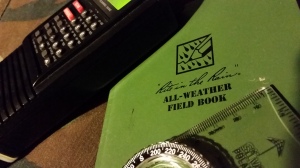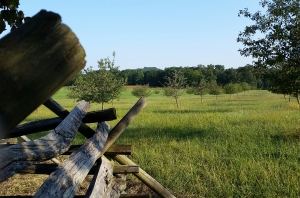In the arena of grid down communications, wilderness plays a big part. In a SHTF scenario you will most likely find yourself operating outdoors at some point. With this in mind, your training should focus on operating in a less than perfect environment.
If you go outside and look around, you are sure to find somewhere you can practice your craft. It can be a park or maybe your friend’s woods? It may even be your backyard. Wherever you choose, get out of the house! Leave the comfort of your shack and go test your kit. You will not know what works for you until you find out what does not work for you! You need to work out the bugs now, not when the sky is falling. You can go camping and take your comms kit. Get your kids involved, set up a base station and give them frs radios to go “on patrol”.
The more comfortable you are with your gear in a real life situations the better off you will be. You need to be able to hike in with your gear. If it’s too heavy, now is the time to work it out. Most of the equipment we use lends itself to field ops, it’s light weight and small. Even a small gel cell battery and a CB radio will do the job. Recently, I went into the woods with a set up just like that. I took my uniden 510xl CB, MFJ tuner a small gel cell battery and some wire. I was able to get comms established in a wooded area under approaching darkness. This is just an example, I could have used my Yeasu 817 or any other portable rig.
You should also be doing this with your monitoring gear. You can pack in a scanner/comms receiver and set up a covert LP (listening post). You perform the same information gathering, just in the wild. Bugs, dirt and snakes brings out the best in people, throw electronics in the mix and now you have a party…..
If weather is a problem, set up a shelter and cover you equipment with gallons freezer bags or trash bags. These are a cheap and effective, not very tactical but they work. If you go in operating QRP (low power operating) you may not make a lot of contacts. It’s not the amount of QSO’s (contacts) you have, it’s the experience of getting your station on the air. The mechanics of field operations are often the most difficult. The one thing to take away from this post is, get off your butt! When you need this stuff there will be no time to practice. Open your squelch and listen for the weak signals……
Dialtone OUT.





Pingback: CAMP COMMS | danmorgan76
Pingback: CAMP COMMS | echo delta sierra
Nice to see I’m not the only one who still has a BC-200XLT in the mix. 🙂
LikeLiked by 1 person
Pingback: Camp Comms | Western Rifle Shooters Association
This is great advice. It reminds me of a childhood friends Dad that was in a Commo unit in the National Guard, after he had retired and I was a young NCO we discussed how his unit could succesfully set up faster and more efficiently than the Active Duty guys. The reason was, They did it 10 months out of the year!
LikeLike
Reblogged this on brushbeater and commented:
Short, sweet and to the point. Read and heed.
LikeLike
Pingback: Dialtone: Camp Comms – Lower Valley Assembly